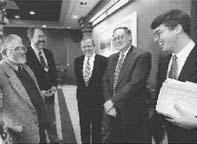What Does It Mean to Be an Evangelical
Christian University?
Challenging the Culture on Its Own Terms
By Philip Eaton, President

E arly in the academic year, I asked the Seattle Pacific University community to join me in a "grand conversation" about who we are and what we want to become. We have engaged in several parts of that conversation: an important series of faculty lectures, discussions with the Board of Trustees, and various events with alumni and friends in the community and around the country.
As an anchoring event to the year's activity, Seattle Pacific hosted a major symposium in February called The University Through the Eyes of Faith: Evangelicalism and Higher Education. We gathered together a truly remarkable group of scholars and speakers from around the world to think with us about what it means to be an evangelical Christian institution of higher learning.
I have been deeply stimulated by these conversations, and I am more convinced than ever about the significance of the mission and work of SPU. I believe ours is a high calling. I believe we have something very important to offer.
In our postmodern world, where an extreme relativism reigns; where a crisis of authority causes great confusion and often results in dangerous fanaticism; where we feel, with William Butler Yeats, that "things fall apart; the center cannot hold; mere anarchy is loosed upon the world," and "the best lack all conviction, while the worst are full of passionate intensity" -- in such a world, I believe the role of an evangelical Christian university is as vital as it has ever been.
Author Lesslie Newbigin asks this important question: "From whence comes the voice that can challenge this culture on its own terms, a voice that speaks its own language and yet confronts it with the authentic figure of the crucified and living Christ so that it is stopped in its tracks and turned back from the way of death?" To which I answer, "Where else but from an evangelical Christian university?"
Contained in Newbigin's question is a wonderful affirmation of what we are. He contends that to confront the dominant culture with the gospel, we must be able to speak the language of culture. And this is the unique work of a university. This is the work of a learning community like ours.
We must be bold and courageous on both sides of this radical venture. On the one hand, we seek to engage and understand the culture in which we live. There can be no separatism here. There can be no fear of broad and free learning. And yet on the other hand we seek a passionate commitment to the transforming work of the gospel.
If we can hold both sides of this venture in balance, in creative tension, against the pressures to slide one way or the other, I think we will have clarified further what it means to be an evangelical Christian institution of higher learning.
In one Symposium session, J. I. Packer, one of the senior voices in evangelicalism, said that in the future, "the role of the Christian university is likely to be more significant than it has ever been." I believe Professor Packer is right. I believe as well that Seattle Pacific is positioned to take a leading role in this great work.
Let us announce, in Newbigin's words again, "the awesome and winsome claim of Jesus Christ to be alone the Lord of all the world, the light that alone shows the whole of reality as it really is, the life that alone endures forever." Let us make that announcement day in and day out on our campus. Winsomely, attractively and appropriately, let us make that announcement in our scholarship and our engagement in the community.
What a bold venture indeed. What reason to be enthusiastic about the future of this great university.

Please read our disclaimer.
Send any questions, comments or correspondence about Response to
jgilnett@spu.edu
|